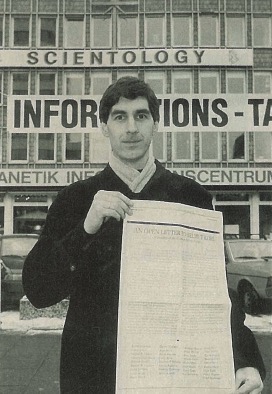From Associated Press reports
In December 1996 Germany’s Federal and regional governments adopted a package of measures to counter what they called the “expansionist aims and claim to domination” of the Church of Scientology. Scientology is an applied religious philosophy of self-improvement, founded in 1954 by American science fiction writer and philosopher L. Ron Hubbard, who died in 1986. The Church, centered in Los Angeles, estimates eight million members worldwide (including India), and 30,000 in Germany.
Trouble in Germany surfaced last summer when youth members of Germany’s ruling Christian Democratic Party demonstrated against the hit movie “Mission Impossible” because its star, Tom Cruise, is a Scientologist. In December, Germany said it would set up a central office to coordinate a federal and state campaign against the Church of Scientology, and would keep people linked to the group out of certain public jobs, such as counseling and teaching. German Chancellor Helmut Kohl’s government accused the Church of driving its recruits into bankruptcy, splitting their families and seeking “domination” of German society, according to a Newsweek report. The respected magazine noted, “The Church has often been accused of brainwashing and fleecing its members and of intimidating its critics with threats and lawsuits.”
Scientologists countered with newspaper ads, most recently an open letter to Kohl in the International Herald Tribune signed by 34 non-Scientologist Hollywood VIPs including Goldie Hawn, Dustin Hoffman and Oliver Stone. It called on Germany to bring “an end to this shameful pattern of organized persecution,” which it likened to Nazi Germany’s treatment of Jews in the 1930s. Furious with the comparison, the government dismissed the ads as an insult to the victims of the Nazis. The Church said Kohl’s dismissal “is typical of the contempt and indifference shown by highhanded German officials to the Church’s extensively documented complaints of discrimination over the past five years.”
In January, US State Department spokesman Nicholas Burns, rebuked both sides in the dispute, but said authorities in Bonn “have interfered, we believe, with the religious rights of many Scientologists, among them American citizens.”
In Greece, an Athens court called the Church a danger to society and ordered it to close, stating that “It is an organization with medical, social and ethical practices that are harmful.” The move followed numerous complaints from relatives of members of the Church who claimed their Greek center transformed their kin into moody or suicidal automatons. Scientologists called the case a sham. International president Jentzsch criticized the case in a letter faxed from Los Angeles, stating “It is unfortunately reminiscent of the former junta that ruled Greece as a totalitarian state, and the assault today is simply because the mission is not orthodox according to the prevailing vested interests in Greece.”
From Associated Press reports
SIDEBAR: ‘OWNER’S MANUAL FOR THE HUMAN MIND’
Author L. Ron Hubbard began his movement with the 1950 publication of Dianetics: The Modern Science of Mental Health. The book was an immediate best seller. It is a 650-page account of Hubbard’s theory of the mind, called Dianetics.. Its goal is to create a “Clear.” A Clear, Hubbard explains in the introduction, is a person free of all psychoses, neuroses and repressions as well as any psychosomatic illness. His intelligence will be “high above the norm,” Hubbard asserts, and “Observation of his activity demonstrates that he pursues existence with vigor and satisfaction.”
The Encyclopedia Britannica explains, “According to Dianetics, every experience is recorded in the mind as a mental image. Painful experiences, called engrams, are not completely available to the ‘analytic,’ or conscious, mind. When stimulated by later experiences, engrams, which are part of the ‘reactive’ or subconscious mind, cause irrational behavior. Therapy requires working with an ‘auditor’ to confront engrams in order to ‘clear’ or free the mind.” Dianetics believes in a thetan as the soul or life energy which reincarnates. Most parishioners believe in God, but it is not a requirement of the system, nor are personal observances such as vegetarianism. It holds that man is fundamentally good, and what is called evil results from aberrations which can be removed permanently through self-knowledge.
